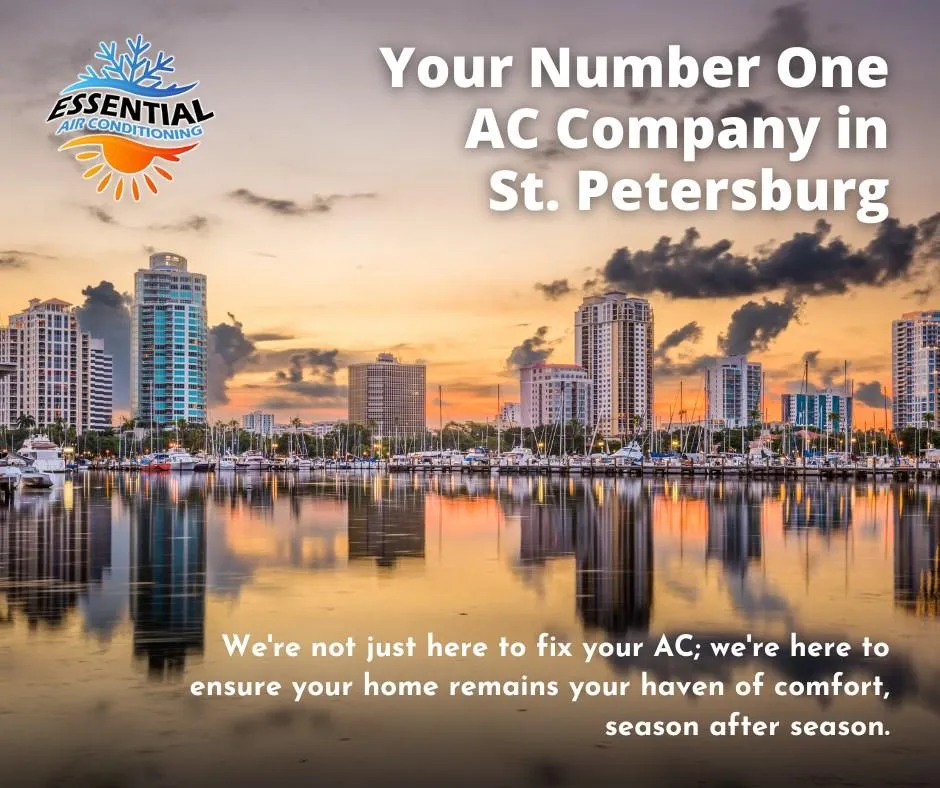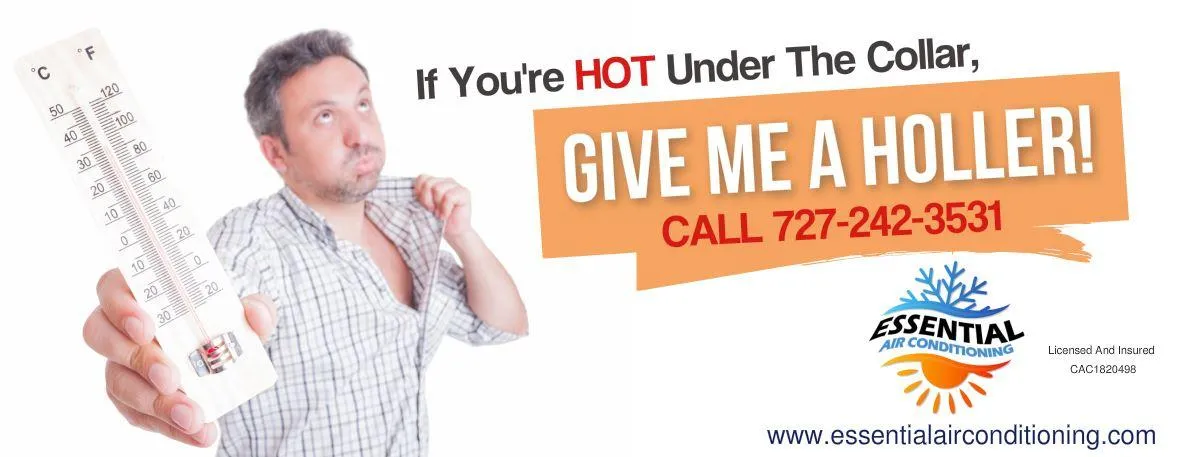SINCE 2010

Is Your Local Trusted HVAC Company!
When You’re Hot Under the Collar, Give Us a Holler!
Why Choose Us?
Need AC Repair? Need your AC units replaced?
ESSENTIAL AIR CONDITIONING is the right contractor for you!
Essential Air Receives 2023 Best of Kenneth City Award
KENNETH CITY September 7, 2023 — Essential Air has been selected for the 2023 Best of Kenneth City Award in the HVAC contractor category by the Kenneth City Award Program. Essential Air have achieved exceptional marketing success in their local community and business category.

HVAC Services We Provide

AC Repair
When you need AC repair, every minute counts. The experts at Essential Air Conditioning will quickly diagnose the issue and get to work fixing the problem right away. We have the experience, tools, and equipment to take care of a wide range of AC repair issues and will make sure your repair is done correctly the first time – every time!

New AC Installation
When AC repair is no longer an option, our experts will help you choose the best replacement unit for your home and budget. Once you’ve chosen your new unit, we’ll quickly and professionally install it, ensuring little to no downtime.
Before we go, we’ll also demo your new system, making sure you know exactly how to use it.

AC Maintenance
Keeping up with your AC maintenance is the best way to avoid expensive emergency AC repair. It will also keep your system running efficiently and help extend the life expectancy of your equipment. Our ongoing maintenance contracts allow you to receive all the professional services you need – whenever you need them!

Quality Testing
At Essential Air Conditioning in Kenneth City, Florida, we understand the importance of quality testing in HVAC systems. Our dedicated team of technicians employs rigorous testing protocols to ensure that every unit we install or repair meets the highest standards of performance and reliability.
From checking for proper airflow and refrigerant levels to testing for optimal temperature control and energy efficiency, we leave no stone unturned in our quest for excellence. With our commitment to quality testing, you can trust that your HVAC system will provide you with comfort and peace of mind year-round. Experience the difference with Essential Air Conditioning today.

Heating Services
Winter chill got you shivering? At Essential Air Conditioning in Kenneth City, Florida, we've got you covered with our top-notch heating services. From furnace installations to heat pump repairs, our skilled technicians are equipped to handle all your heating needs with precision and expertise.
We understand the importance of a warm and cozy home during the colder months, which is why we go the extra mile to ensure your heating system is operating efficiently and reliably.
Whether you're looking to upgrade your heating system or need a quick fix, trust Essential Air Conditioning to keep you warm and comfortable all winter long. Contact us today to schedule your heating service and say goodbye to the cold!

Air Quality Services
Essential Air Conditioning provides a variety of indoor air quality services. This includes installing air handler UV systems, whole-home UV and ionic systems, and electronic air cleaners.
Not sure which one is right for your home? Simply schedule a consultation and our experts will help you weigh the pros and cons of each option. Once you’ve made your decision, we’ll professionally install your system and ensure it’s working correctly.
We also provide ongoing indoor air quality maintenance services so you can always feel confident that the air in your home is clean, safe, and odor-free.

Expert Technician

Residential and Commercial Services

Professional Workmanship

100% Satisfaction Guaranteed
Why People Choose Essential Air Conditioning?

When it comes to choosing an AC repair, installation, and maintenance company, you have plenty of options. Why should you choose us?
Here are a few reasons why so many St. Petersburg homeowners put their trust in Essential Air Conditioning:
We bring decades of experience to each job
We are reliable, fully licensed, bonded, and insured
We provide a 100% satisfaction guaranteed high quality service
We use cutting-edge products and AC repair technologies
We provide free consultation explaining our customers the best options
We are highly responsive and offer fair pricing
How it Works

Make Appointment
Ready to take control of your indoor comfort? Schedule an appointment with Essential Air Conditioning today by calling our friendly team at (727) 242-3531.
Whether you need a routine maintenance check, emergency repair, or installation of a new HVAC system, our experts are here to help. Don't let HVAC issues disrupt your comfort – call us now to book your appointment and experience reliable service you can trust.

Discuss Budget
At Essential Air Conditioning, we understand that every home and business owner has unique budget considerations. That's why we're committed to working with you to find HVAC solutions that fit your financial needs.
Whether you're looking for an affordable repair, considering a cost-effective maintenance plan, or exploring financing options for a new installation, our team is here to help.
Schedule a consultation today to discuss your budget with our knowledgeable experts and discover how we can tailor our services to meet your financial goals. Your comfort and satisfaction are our top priorities, so let's work together to find the perfect HVAC solution for you.

Get Confirmation
Your comfort is our priority at Essential Air Conditioning, and we're excited to assist you with your HVAC needs. To ensure a smooth and timely service experience, we kindly ask that you confirm your appointment with us.
Simply give us a call at
(727) 242-3531 or reply to our confirmation email, and our friendly team will take care of the rest.
Confirming your appointment helps us better prepare for your visit and ensures that we can provide you with the exceptional service you deserve. Thank you for choosing Essential Air Conditioning – we look forward to serving you!

Happy Services
At Essential Air Conditioning, we believe in more than just fixing HVAC systems – we believe in delivering happiness. Our dedicated team is committed to providing you with not only top-notch technical expertise but also with a service experience that leaves you smiling.
From our prompt arrivals to our courteous technicians, we go above and beyond to ensure your satisfaction at every step. Experience the joy of reliable HVAC solutions with Essential Air Conditioning.
Schedule your service today and discover why our customers are always happy!
Heating and AC Repair, Installation & Maintenance Services
From sweltering heat to high humidity, there are many reasons why you need an experienced AC company you can trust.
Essential Air Conditioning has been providing top-quality AC services to homeowners in St. Petersburg and the surrounding area for over seven years.

Expert Repairman
We’re a full-service, family-owned AC company with a passion for providing quality workmanship. Whether you need a simple AC repair, new system installation, or ongoing maintenance, we’ll take care of all your AC needs. We also provide an array of indoor air quality services to fit any budget. No matter what level of service you need, you can count on us to keep your home cool and comfortable so you and your family can breathe easy.

Satisfied Services
Our on-time service, fair pricing, and exceptional customer care has earned us our reputation as one of St. Petersburg’s most trusted AC companies. Contact us today to learn more.

Service Areas
Kenneth City
Saint Petersburg
Largo
Clearwater
Seminole
Pinellas Park
Bay Pines
Gulfport
Pasadena
Feather Sound
South Tampa
Shore Acres



